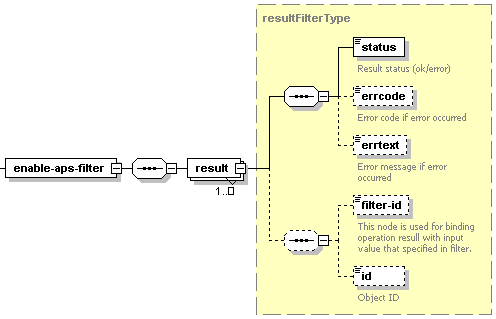Excluding All Apps from a Reseller Account
The enable-aps-filter operation makes all applications unavailable for specified reseller accounts. Specified resellers will not be able to include applications in their service plans.
Request Packet Structure
A request XML packet of the enable-aps-filter has the following structure:
<packet>
<reseller>
<enable-aps-filter>
...
</enable-aps-filter>
</reseller>
</packet>
The enable-aps-filter node is presented by type
ResellerApsFilterTypeInput (reseller.xsd). Its graphical
representation is as follows:

Note: The interactive schema navigator for all request packets is available here: http://plesk.github.io/api-schemas/1.6.9.1/agent_input.svg.
- The filter node is required. It specifies a reseller account which will be able to control the apps list. Data type: ResellerSelectionFilter. For more information on filters, refer to the Available Filters section.
Response Packet Structure
The enable-aps-filter node of the response packet is structured as follows:

Note: The interactive schema navigator for all response packets is available here: http://plesk.github.io/api-schemas/1.6.9.1/agent_output.svg.
-
result, required.
It wraps the response got from the server. Data type:
resultFilterType (
common.xsd). - status, required. It specifies the execution status of the operation. Data type: string. Allowed values: ok | error.
- errcode, optional. It returns the error code when the operation fails. Data type: unsignedInt.
- errtext, optional. It returns the error message if the operation fails. Data type: string.
- filter-id, optional. It returns the parameter by which the reseller account was filtered by in the request packet. Data type: anySimple.
-
id, optional.
It returns the identifier of the reseller account for which the
applications filter was turned on. Data type: id_type
(
common.xsd).
Samples
A packet that makes all applications unavailable for the reseller account with ID 1234 looks as follows:
<packet>
<reseller>
<enable-aps-filter>
<filter>
<id>1234</id>
</filter>
</enable-aps-filter>
</reseller>
</packet>
Response:
<packet>
<reseller>
<enable-aps-filter>
<result>
<status>ok</status>
<filter-id>1234</filter-id>
<id>1234</id>
</result>
</enable-aps-filter>
</reseller>
</packet>